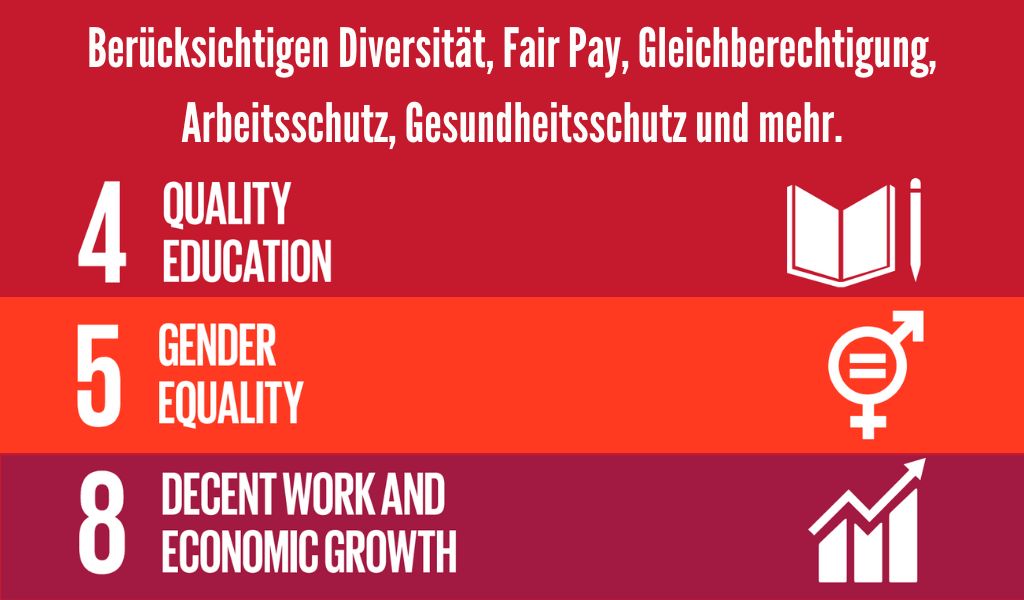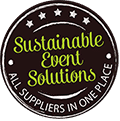Consider the aspects of accessibility and inclusion at events as well as adequate and legible signage. An interpreter* for the deaf may also be available. Ask the locations and service providers for appropriate solutions.
As part of a diverse society, we are called upon to create structures that enable everyone - including people with disabilities - to participate in or work at events.
This includes the other social aspects of sustainable events such as diversity, fair pay, equality, occupational health and safety, health protection and much more.

How your actions pay off on the SDGs
"Event for ALL" - inclusion, participation and equality link to all SDGs, they play a special role for the SDGs.
- 4 - quality education,
- 8 - decent work and economic growth
- and 10 - fewer inequalities.
Source: https://www.renn-netzwerk.de/west/detail/news/sdgs-leicht-erklaert
- SDG4: By 2030, ensure equal access for all women and men to affordable and quality technical, vocational and tertiary education, including higher education. Share your knowledge.
Goal 4: Education - SDG5: Achievegender equality and empowerall women and girls
Goal 5: Achieve gender equality and empower all women and girls
5.1 End all forms of discrimination against women and girls everywhere
5.5 Ensure women's full and effective participation and equal opportunities in leadership roles at all levels of decision-making in political, economic and public life - SDG8: Promote sustained, inclusive and sustainable economic growth, full and productive employment and decent work for all - Question the origin of your working materials
8.4 By 2030, progressively improve global resource efficiency in consumption and production and aim to decouple economic growth from environmental degradation, in line with the Ten-Year Program Framework on Sustainable Consumption and Production Patterns, with developed countries taking the lead
Promote inclusive and sustainable economic growth, employment and decent work for all - SDG10: By 2030, strengthen and promote the social, economic and political inclusion of all people regardless of age, gender, disability, race, ethnicity, origin, religion, or economic or other status
Goal 10: Reduce inequality within and among countries

Practical tips for accessibility and inclusion at events
The event industry plays an important role in promoting inclusion and accessibility. It is crucial that all people, regardless of their abilities, have equal opportunities to participate in and benefit from events.
There are about 9 million people with disabilities in Germany who are often excluded from cultural events and activities. This is not only an ethical problem, but also an economic one. Events that prioritize accessibility and inclusion can attract a larger audience and thus lead to higher sales.
As an organizer, you can take various measures to ensure that your events are accessible to all. These include the use of barrier-free facilities such as ramps, elevators, inductive hearing systems and accessible toilets. Providing sign language interpreters, audio descriptors or written information in easy language is also important. The provision of seating for people with mobility impairments and the possibility for accompanying persons to attend free of charge should also be considered.
By promoting inclusion and accessibility, you as an event organizer create not only a positive social impact, but also a positive economic impact. People with disabilities have the right to have the same cultural experiences as everyone else. Events that achieve this goal are not only appreciated by people with disabilities, but also by a larger audience that recognizes the importance of accessibility and inclusion.
Promoting inclusion and accessibility also goes hand in hand with promoting diversity, fair pay and equality. People from different backgrounds and with different skills can contribute their individual talents and perspectives, contributing to a stronger and more diverse event industry. The stage program or the selection of speakers and artists should also be able to represent equality, diversity and inclusion.
In summary, promoting inclusion and accessibility in the event industry is both ethically and economically necessary. By implementing measures that create an inclusive environment, event organizers can reach a larger and more diverse audience, contributing to a positive impact on society.
Examples of accessibility and inclusion at events
Women of the World Festival
The annual women's festival in London aims to celebrate and empower women and girls of all ages and backgrounds. It offers a diverse program of art, discussions and workshops that focus on women's rights, equality and diversity.
Kampnagel Cultural Center
The Kampnagel cultural center in Hamburg is committed to sustainability in all its facets and offers an inclusive program with a focus on queer and feminist issues. It also focuses on inclusive accessibility by providing information about accessibility and barrier-free offerings on its website.
Pride Parade
The Pride Parade is an annual parade held in many cities around the world celebrating and supporting the LGBTQI+ community. The parade stands for a world of tolerance and respect for all people, regardless of their sexual orientation or gender identity.
Social Business Forum
The annual Social Business Forum in Milan is an international conference focused on promoting social business and sustainability. The event brings together entrepreneurs, investors, academics and government representatives to collaborate on solutions that have both social and economic impact.
St. Pauli night market
The St. Pauli Night Market is a weekly market in the heart of Hamburg that brings together local producers and artisans and promotes fairness and equality. The market places great emphasis on sustainable business and combines the concept of sustainability with social aspects such as inclusion and diversity.
Now it's your turn - how do you ensure accessibility and inclusion at your event?
Let me know how you have provided for inclusion and accessibility at your event or how you plan to do so in the future.
- Are you thinking ahead of time about ramps, elevators, inductive listening systems or accessible restrooms?
- Do you provide an interpreter for deaf participants?
- Is your voting tool accessible, such as that of TEDME?
Discuss with me - for example directly on my LinkedIn profile.

Get the free Sustainability Rider now and discover what you can do for sustainable events today.


